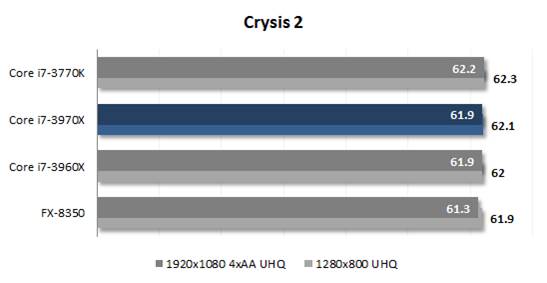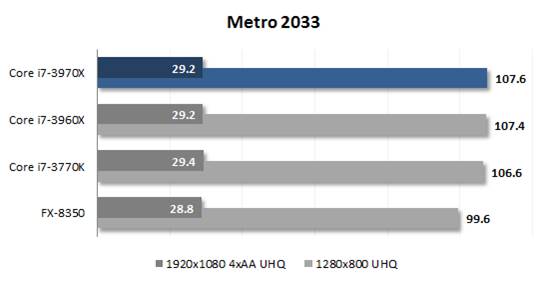Unfortunately, over the past year when Core
i7-3960X remained the leading LGA 2011 contender, no other worthy competitions rised.
So, officailly speaking, there is nothing to compare against the new Core
i7-3970X at this time. It is undeniable that it will be the fastest desktop microprocessor
today, even without the need of testing. However, there still are a few things
to note. First, the main strength of the new Core i7-3970X is its ability to
process up to 12 flows simultaneously, so it can demonstrate unforseable
results only in multi-flows tasks. In more common cases, when the computing
cores of this monster are not fully used, it could easily yield to the top LGA
1155 Core i7-3770K microprocessor on Ivy Bridge microarchitecture that proposes
higher relative performance on each core. Another issue with Core i7-3970X is
that the only compatible chip, Intel X79 Express, can’t get fully certification
for PCI Express 3.0. As a result, some contemporary graphics cards, such as
GeForce GTX 680 and GTX 670 by default work in PCI Express 2.0 mode in LGA 2011
systems. There’s no other contemporary desktop systems have issues like that.

Intel
Core i7-3970X Extreme Edition Processor
All this shows that it won’t be fair to annouce
the LGA 2011 platform the last universal and fastest solution. Therefore, we keep
on comparing Core i7-3970X not only against its predecessor, but also against
the leading CPUs for the other two desktop platforms – LGA 1155 and Socket
AM3+.
As a result, our tests are configured to
use the following software and hardware components:
Micromicroprocessor
·
AMD FX-8350 (Vishera, 8 cores, 4.0-4.2 GHz, 4 x
2 MB L2, 8 MB L3);
·
Intel Core i7-3770K (Ivy Bridge, 4 cores + HT,
3.5-3.9 GHz, 4 x 256 KB L2, 8 MB L3);
·
Intel Core i7-3960X Extreme Edition (Sandy
Bridge-E, 6 cores + HT, 3.3-3.9 GHz, 6 x 256 KB L2, 15 MB L3);
·
Intel Core i7-3970X Extreme Edition (Sandy
Bridge-E, 6 cores + HT, 3.5-4.0 GHz, 6 x 256 KB L2, 15 MB L3).
Micromicroprocessor coller: NZXT Havik 140
Motherboard
·
ASUS Crosshair V Formula (Socket AM3+, AMD 990FX
+ SB950);
·
ASUS P8Z77-V Deluxe (LGA1155, Intel Z77
Express);
·
ASUS Rampage IV Formula (LGA2011, Intel X79
Express).
Graphics card: Nvidia GeForce GTX 680 (2 GB/256 bit GDDR5, 1006/6008 MHz).
Memory
·
2 x 4 GB, DDR3-1866 SDRAM, 9-11-9-27 (Kingston
KHX1866C9D3K2/8GX);
·
4 x 4 GB, DDR3-1866 SDRAM, 9-11-9-27 (Kingston
KHX1866C9D3K2/8GX).
Secondary disk system: Intel SSD 520 240 GB (SSDSC2CW240A3K5).
Power-prividing unit: Corsair AX1200i (80 Plus Platinum, 1200 W).
OS: Microsoft
Windows 8 Enterprise x64
Disk drive
·
AMD Chipset Driver 12.10;
·
Intel Chipset Driver 9.3.0.1025;
·
Intel Management Engine Driver 8.1.2.1318;
·
Intel Rapid Storage Technology 11.6.0.1030;
·
NVIDIA GeForce 306.97 Driver.
Performance
Overall performance
As usual, we normally use Bapco SYSmark
2012 set to estimate the microprocessor performance in general-oriented tasks.
It simulates the models used in popular office and digital content creation and
processing applications. The idea behind this test is fairly simple: it
produces a single score characterizing the average computer performance. After releasing
the updated Windows 8 SYSmark 2012 1.5 version, this is exactly the version we
are using in our test session.

The
total performance score put Core i7-3970X to the top of the chart.
As we have expected, the total performance
score in general purpose tasks puts Core i7-3970X on top of the charts. And it
is nothing surprising that it is only 3% higher than its predecessor - Core
i7-3960X: slightly increase in the clock frequency hardly produced a more
powerful effect.
Let’s take a closer look at the performance
scores SYSmark 2012 created in different using situations. Office productivity situation
simulates typical office tasks, such as text editing, electronic tables
processing, email and web surfing. This situatiomn uses the following
applications: ABBYY FineReader Pro 10.0, Adobe Acrobat Pro 9, Adobe Flash
Player 10.1, Microsoft Excel 2010, Microsoft Internet Explorer 9, Microsoft
Outlook 2010, Microsoft PowerPoint 2010, Microsoft Word 2010 and WinZip Pro
14.5.

Office
performance situation
Media creation situation simulates the
creation of a video clip using previously taken digital images and videos. They
use popular Adobe sets: Photoshop CS5 Extended, Premiere Pro CS5 and After
Effects CS5.

Media
creation situation
Web Development is a situation simulating
web-site designs. It uses the following applications: Adobe Photoshop CS5
Extended, Adobe Premiere Pro CS5, Adobe Dreamweaver CS5, Mozilla Firefox 3.6.8
and Microsoft Internet Explorer 9.

Data/Financial analysis situation is used
for statistical researches and prediction of market trends, performed in
Microsoft Excel 2010.

Statistical
researches and prediction of market trends
3D modeling situation is fully used for 3D
objects and output of static and dynamic scenes using Adobe Photoshop CS5
Extended, Autodesk 3ds Max 2011, Autodesk AutoCAD 2011 and Google SketchUp Pro
8.

3D
modeling situation
The last situation, called system
management, creates backups and installs software and updates. It includes
several different versions of Mozilla Firefox Installer and WinZip Pro 14.5.

System
management situation
In general, six-core LGA 2011 micromicroprocessors
lead in specific using situation. However, there are a few exceptions, when the
Ivy Bridge microprocessor design proves to be more efficient even though the leading
microprocessor based on it has only 4 cores instead of 6. Long-sighted when
larger number of cores doesn’t guarantee better performance, including
multi-media content processing and system management.
Gaming
performance
As you know, it is the graphics subsystem
that determines the performance of the entire platform equipped with pretty
high-speed chips in the most of the contemporary games. Therefore, we select
the most CPU-depending games and double the fps readings. The first test is
performed without anti-aliasing feature and it’s far to have the highest screen
resolutions. These settings allow us to determine how well the microprocessors
can deal with the gaming loads in general and how the tested CPUs will react in
the near future, when faster graphics card models will be widely available. The
second test is performed with more real settings - in FullHD resolution and
maximum FSAA settings. In our opinion, these results are less interesting, but
they demonstrate clearly the level of performance we can expect from microprocessors.

Game
Batman Arkham City

Game
Borderlands 2

Game
Crysis 2

Game
Dirt Showdown

Game
Far Cry 2

Game
Metro 2033
We have already expressed before that LGA
2011 platform can hardly be considered and ideal gaming solution. Some issues
with PCI Express 3.0 support and six-core design, things which contemporary
games do not have full advantage of, make this platform less attracting for
gaming needs than LGA 1155. Yes, LGA 2011 mainboards boast full support for a series
of multi-GPU graphics configurations, which doesn’t require any additional
hubs, but not everyone will appreciate this feature. In a more general case, as
we can see, the system with Core i7-3770K inside can also work as well as a
system with the new Core i7-3970X in FullHD resolution with highest image
quality settings. Still, this LGA 1155 system will be more affordable. Despite
that, we can’t miss huge potential of the LGA 2011 system. If the graphics
sub-system is not the limiting factor, and the game knows to create many
parallel flows, then Core i7-3970X becomes an indisputable leader.